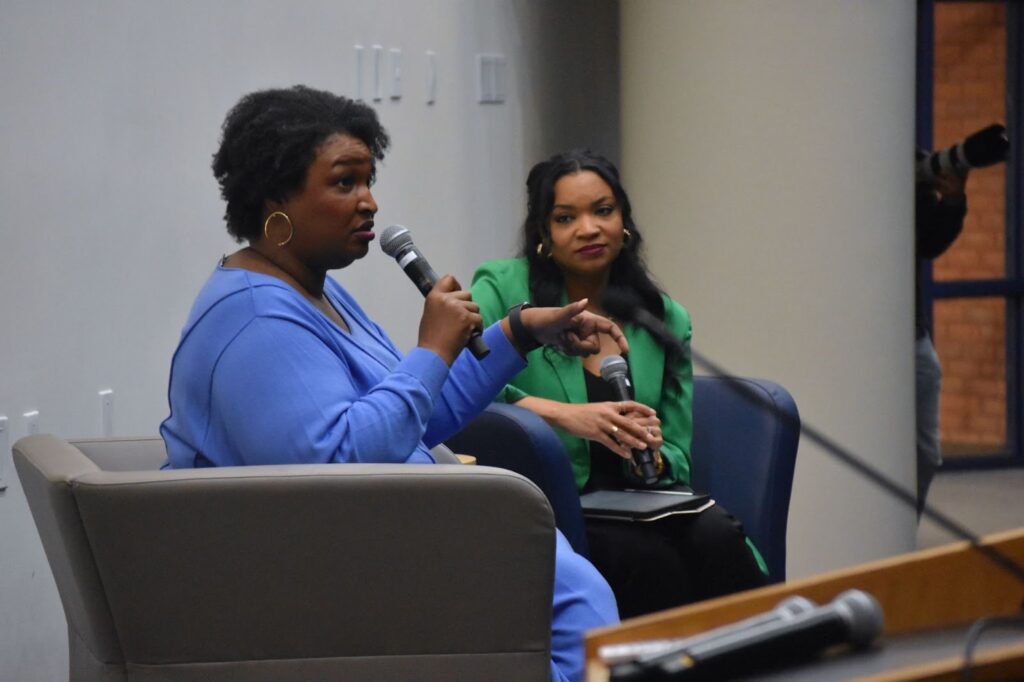
Stacey Abrams, the inaugural Ronald W. Walters Chair for Race and Black Politics at Howard University, began her 2024 Speaker Series last Wednesday in the School of Business Auditorium.
Moderated by Tia M. Dickerson, a Ph.D. candidate in the Department of Sociology and graduate assistant to the endowed chair, Abrams discussed leadership and political engagement, the first of many topics she will explore throughout the speaker series.
To an auditorium of over 275 attendees, Abrams emphasized the importance of not just participating in civic engagement but also encouraging other citizens to become equally involved.
“We think ‘leadership’ is about doing everything everywhere, all at once. [However] it is about doing something, somewhere, soon,” Abrams said. “Leading from where you are means finding a place to stand and starting to do the work.”
Abrams’ call to action, is an added motivator for student-led organizations on campus that have sought to increase political engagement by providing information about local and national elections, absentee ballots and more.
Jasmine Rivera, a graduating senior psychology major and president of the Howard University Chapter of the National Association for the Advancement of Colored People (NAACP), stressed the importance of increasing voter education on campus and within the local community as a means to increase civic engagement.
“Knowing [that] as a Black person, within the system, not everyone has our best interest at heart. One of the ways to overcome that obstacle is to have our own best interest at heart,” Rivera said. “If people aren’t advocating for you, advocate for yourself and your community.”
Julianna Boye, a graduating senior political science major and president of Howard University College Democrats, also echoed Abrams’ and Rivera’s sentiments.
“Politics and policies are everybody’s issues, regardless of what you are interested in because policy, politics and who we elect to represent us matters,” Boye said.
Abrams and Dickerson also discussed several important issues facing students, including voter suppression and gerrymandering. Abrams explained the importance of participating in local and state elections as a means for combatting the recent devolution of political power to state levels.
“I focus on state and local races because that is where the power is. All of the things that we worry about on a daily basis are local and state government [issues],” Abrams said.
Lydia Makondo, a Hampton University alumna and current master’s student in international education at George Washington University, agreed with Abrams’ stance on local elections.
“Voting is a scale [and] you need to vote locally. We need to understand that local and regional elections are important,” Makondo said.
Abrams also provided Howard students with advice for navigating imposter syndrome and learning from failures.
“One of the extraordinary pieces of being a student at an HBCU is [understanding] that learning means trying and not succeeding. Learning requires failure,” Abrams said.
Abrams concluded the dialogue by answering questions posed by student attendees concerning the importance of safeguarding voting rights, protecting DEI initiatives and the role of identity politics in campaign efforts.
“As an aspiring Black woman in politics, Stacey Abrams is one of my inspirations. I am excited to hear her perspective on the 2024 elections,” attendee JoJo Okrah, a freshman political science major said.
Following the event, Abrams spoke to The Hilltop about her mission and upcoming plans for the series.
“My mission is to really expand the way we think about politics to include all of the ways that our lives are impacted by governments and leadership,” Abrams said.
Abrams discussed the responsibilities of elected officials in keeping young voters engaged and mobilized. She emphasized transparency and offering young people points of entry into the political process so they could see how their participation creates changes around the nation.
“Until people see the connective tissue between their lives and government, there’s very little incentive for engagement,” Abrams said.
Abrams explained the reasoning behind her decision to engage directly with students, especially at Howard.
“Young people writ large are amazing translators. More importantly, young people with an education have access to information and to context that may not be readily available to the broader community,” Abrams said.
“Howard students – because of the diversity of thought and the expanse of education – have the ability to help others understand what the challenges are, why they are challenges and ways to solve them,” Abrams explained.
Abrams seeks to engage with students on a variety of topics moving forward. She said future events will cover issues concerning artificial intelligence (AI), climate change and a broad discussion of the various roles of importance in the upcoming 2024 election.
More information regarding next month’s fireside chat with Abrams can be found on the Howard University Instagram page and the Ronald W. Walters Center website.
Copy edited by D’ara Campbell

